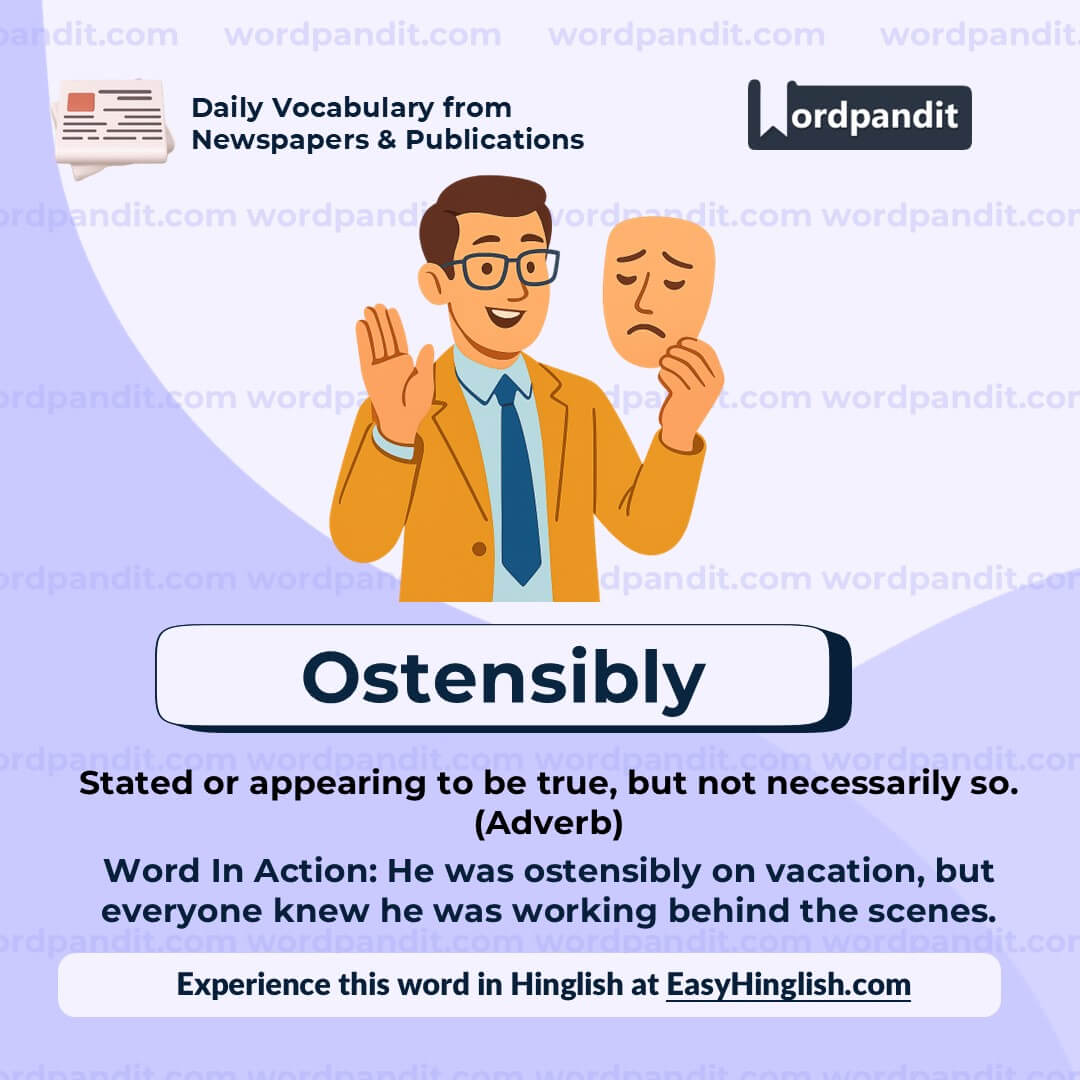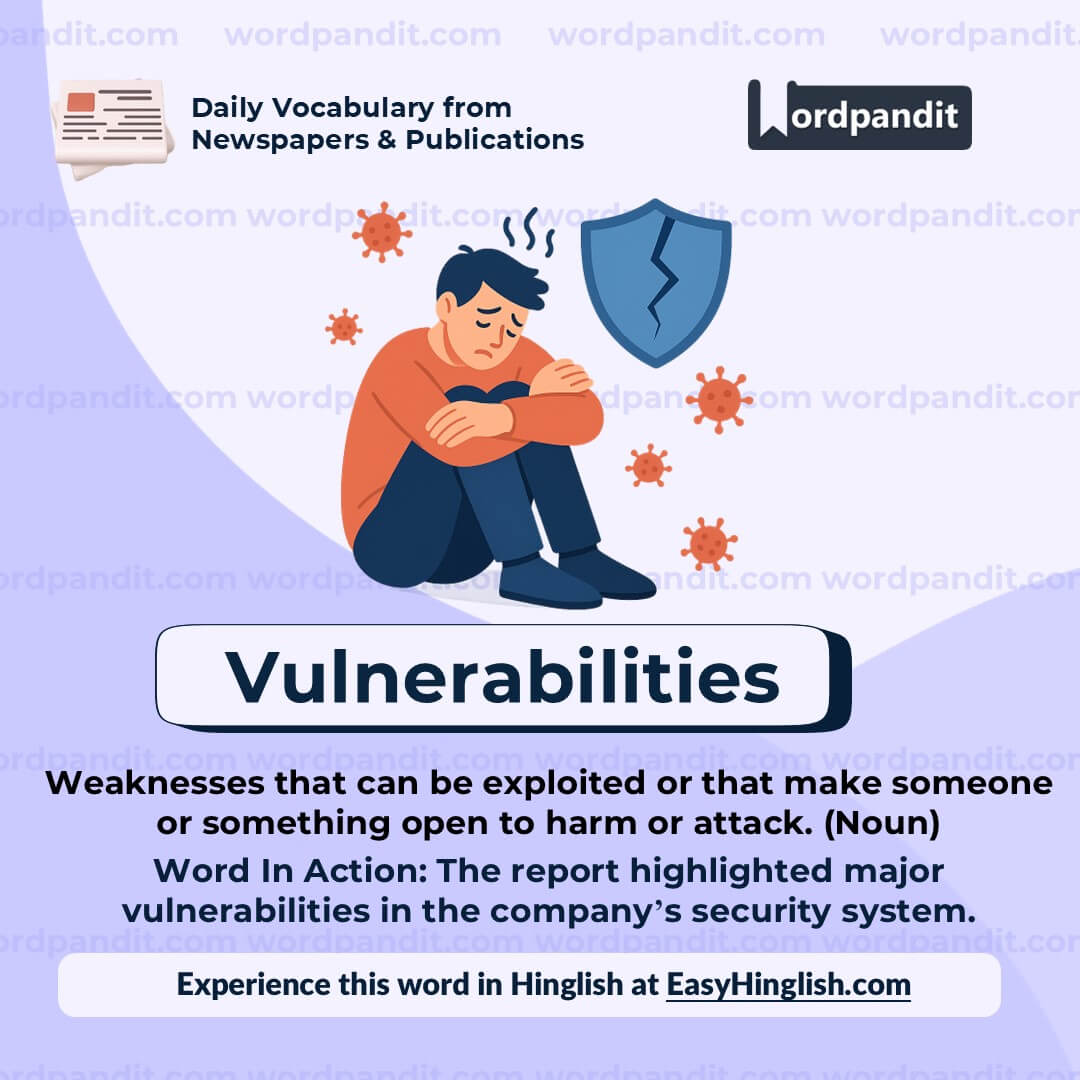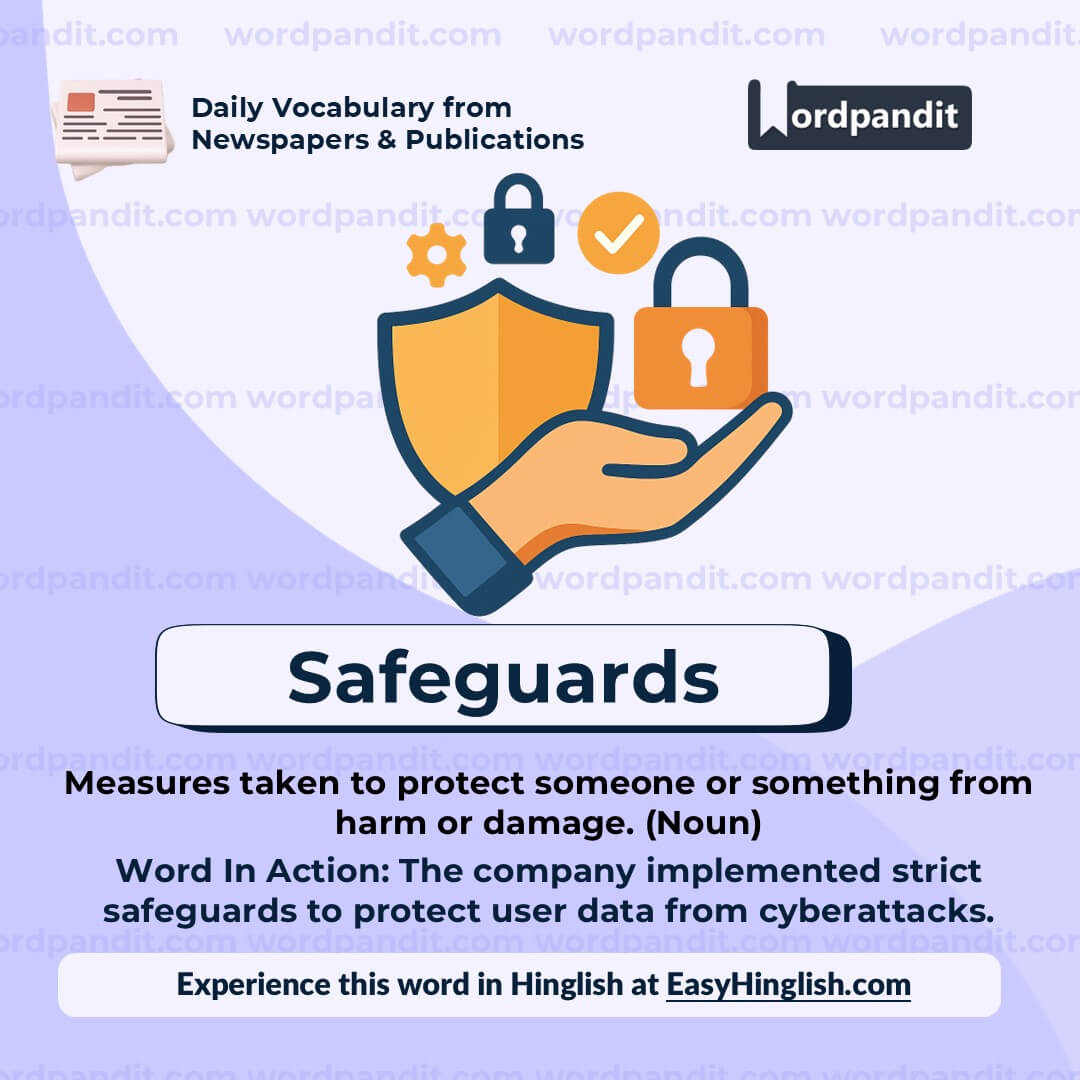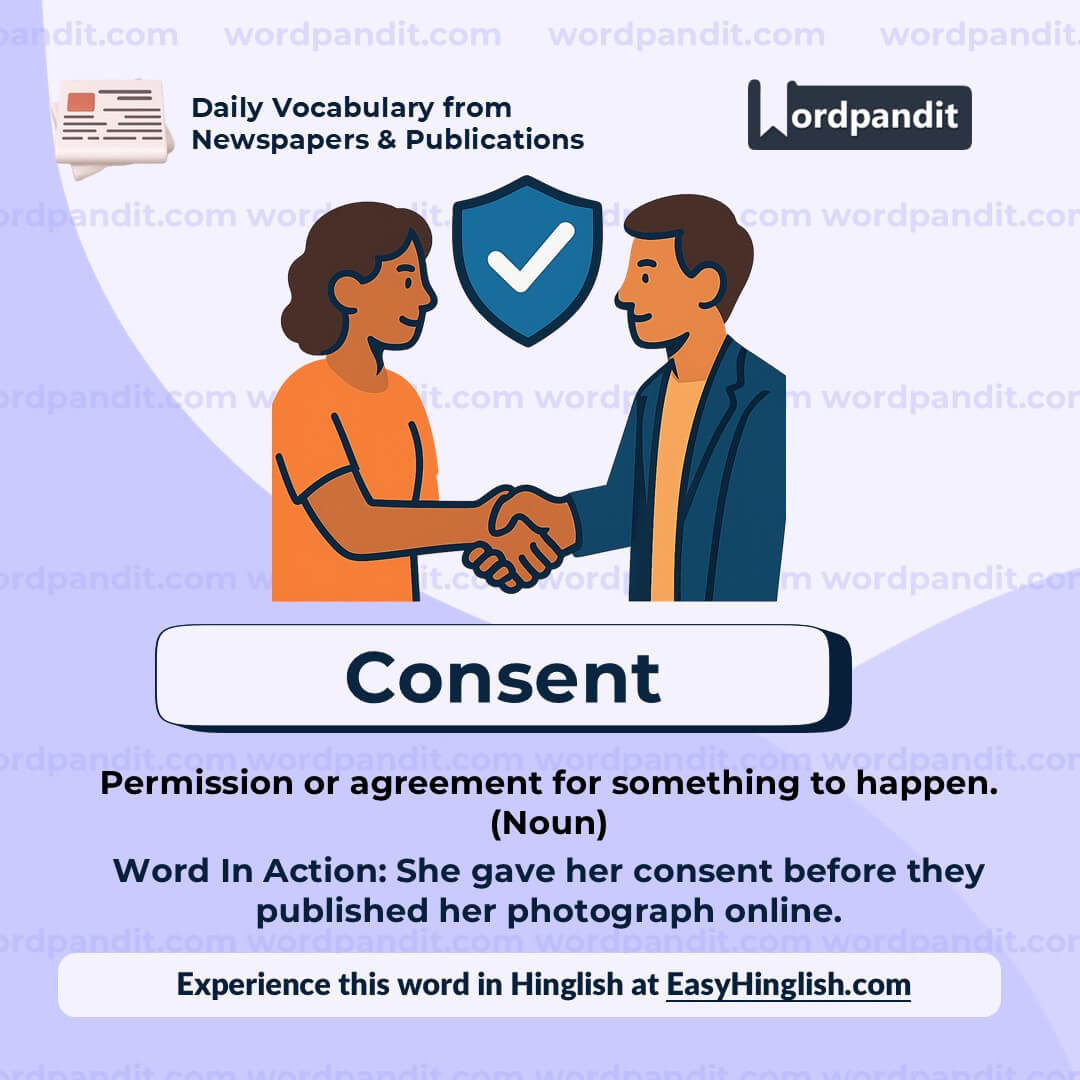Daily Vocabulary from Indian Newspapers and Publications
Welcome to Wordpandit’s Indian Vocabulary Hub
At Wordpandit, we understand the importance of staying rooted in the local context while expanding your language skills. This section focuses on enriching your vocabulary with words and phrases drawn from India’s leading newspapers and publications, ensuring you're learning vocabulary that is practical, relevant, and uniquely Indian.
Why Indian Sources Matter
We believe that the best way to master any language is by immersing yourself in local content. That’s why we carefully curate vocabulary from top Indian publications, including:
- The Hindu
- The Times of India
- The Economic Times
- Hindustan Times
- Live Mint
- The Indian Express
- And many others...
Stay Updated, Stay Relevant
With daily updates from Indian news sources, you’ll be consistently learning words that reflect the trends and shifts in Indian society and culture. Our focus is to provide vocabulary that enhances your understanding of the language in an Indian context.
How Wordpandit Supports Your Goals
Whether you’re preparing for exams, aiming to improve your professional communication, or simply want to stay connected with the latest Indian vocabulary, Wordpandit is here to guide you every step of the way.
Learn with a Practical Approach
Our interactive learning methodology includes real-world examples, engaging activities, and context-specific usage to ensure that every word becomes part of your active vocabulary.
Dive into Indian Vocabulary Today!
Why Choose Wordpandit?
Practical Learning: Focus on words you'll actually encounter in real-world reading, enhancing your comprehension and communication skills.
Diverse Content: From current affairs to scientific breakthroughs, our varied sources expose you to vocabulary across multiple domains.
Effortless Integration: Make Wordpandit a part of your daily routine. Just a few minutes each day can significantly boost your lexicon over time.
Your Path to Vocabulary Mastery
- Visit our Daily Vocabulary section regularly
- Explore new words and their usage in context
- Practice incorporating these words into your own writing and speech
- Track your progress as your vocabulary expands
Start Your Journey Today
Embark on your vocabulary enhancement journey with Wordpandit. By consistently engaging with our daily posts, you'll build a robust vocabulary that serves you well in academic, professional, and personal contexts.
Remember, a word a day keeps linguistic limitations at bay. Make Wordpandit your daily companion in the quest for vocabulary excellence!
WORD-1: Ostensibly
Context:
"Among the assortment of colourful characters on season 3 of the trending show *The White Lotus* are three long-term girlfriends — ostensibly unwinding at a luxurious Koh Samui hotel but actually well in the throes of agonising mid-life crises." - The Indian Express
Explanatory Paragraph:
"Ostensibly" is used when something appears to be a certain way on the surface, but the underlying reality may be different. It’s like saying “on the face of it” or “apparently,” often implying that the truth may not match the appearance. In the sentence above, the women seem to be on a relaxing vacation, but are actually dealing with deep personal issues.
Meaning: Apparently or seemingly, but perhaps not actually (Adverb)
Pronunciation: uh-STEN-suh-blee
Difficulty Level: ⭐⭐⭐ Intermediate
Etymology: From Latin *ostendere*, meaning "to show" or "to display"
Prashant Sir's Notes:
"Ostensibly" is a great word for critical writing and analysis. It helps question surface-level interpretations. When analyzing texts or events, ask what is being shown versus what might be hidden underneath.
Synonyms & Antonyms:
Synonyms: Apparently, Seemingly, Allegedly, Supposedly
Antonyms: Truly, Genuinely, Actually, Really
Usage Examples:
- He was ostensibly attending the conference for work, but spent most of his time sightseeing.
- The new law was ostensibly introduced to improve public safety, but critics say it's about surveillance.
- She ostensibly smiled through the event, hiding her disappointment.
- The organization is ostensibly non-profit, but its finances tell a different story.
Cultural Reference:
"The Truman Show" — Truman lives an ostensibly perfect life in a peaceful town, but it's actually a TV set built around him. - Film Reference
Think About It:
Can you think of a time when something appeared to be one way, but turned out to be something entirely different?
Quick Activity:
Write a sentence using "ostensibly" to describe a public figure or event where appearances might be misleading.
Memory Tip:
Think: *"Ostensibly = Obvious? Not so fast!"* — what seems obvious may be hiding something deeper.
Real-World Application:
"Ostensibly" is useful in essays, critiques, and news articles where it's important to differentiate between appearance and reality — especially in politics, media, or literature analysis.
WORD-2: Agonising
Context:
"Among the assortment of colourful characters on season 3 of the trending show *The White Lotus* are three long-term girlfriends — ostensibly unwinding at a luxurious Koh Samui hotel but actually well in the throes of agonising mid-life crises." - The Indian Express
Explanatory Paragraph:
"Agonising" describes something that causes intense mental or physical pain. It can refer to both emotional distress—like difficult decisions, heartbreaks, or crises—and physical suffering. In the context of *The White Lotus*, it emphasizes the deep emotional turmoil the characters are experiencing beneath their glamorous holiday exterior.
Meaning: Causing great physical or emotional pain (Adjective)
Pronunciation: AG-uh-ny-zing
Difficulty Level: ⭐⭐ Beginner to Intermediate
Etymology: Derived from the Greek word *agonia*, meaning "a struggle or contest"
Prashant Sir's Notes:
“Agonising” is a powerful emotional word. Use it carefully to highlight the depth of pain or difficulty. Great for creative writing and expressive essays when describing emotionally intense situations.
Synonyms & Antonyms:
Synonyms: Painful, Torturous, Harrowing, Excruciating, Distressing
Antonyms: Comforting, Pleasant, Soothing, Easy
Usage Examples:
- It was an agonising decision to leave her hometown and move abroad.
- The wait for the medical results was agonising.
- He went through an agonising recovery process after the accident.
- She gave an agonisingly emotional performance in the final scene.
Cultural Reference:
In the novel *The Bell Jar* by Sylvia Plath, the protagonist experiences the agonising weight of depression, revealing the internal struggle behind external appearances. - Literature Reference
Think About It:
What makes emotional pain harder to deal with than physical pain? Can you describe a situation where an “agonising” decision changed your path?
Quick Activity:
List three situations that could be described as “agonising” and explain why. Try to include one from real life, one from literature, and one hypothetical.
Memory Tip:
Remember: *Agonising = Agony Inside*. Think of deep, inner pain that’s hard to shake off.
Real-World Application:
Use “agonising” in both spoken and written English to describe painful choices, stressful experiences, or intense emotions. It adds emotional weight to personal stories, therapy sessions, or journalistic writing.
WORD-3: Vulnerabilities
Context:
"Personal data is central to digital economies, enabling access to a range of services while also creating vulnerabilities. Data protection laws have been seen as safeguards against misuse." - The Hindu
Explanatory Paragraph:
"Vulnerabilities" refer to weaknesses or flaws that make something susceptible to harm or exploitation. These can be physical, emotional, or, as in this context, digital. In a digital world, vulnerabilities in data systems mean that sensitive information can be exposed, stolen, or misused unless protected by strong laws and systems.
Meaning: Weaknesses or flaws that expose someone or something to harm or risk (Noun – plural)
Pronunciation: vuhl-nuh-ruh-BIH-luh-teez
Difficulty Level: ⭐⭐⭐ Intermediate
Etymology: From Latin *vulnerare* meaning "to wound" + *-ability* (capacity)
Prashant Sir's Notes:
“Vulnerabilities” is often used in cybersecurity, psychology, and social policy. Always ask: Where is the weakness? And who or what could exploit it? Understanding this word helps in risk analysis and strategic thinking.
Synonyms & Antonyms:
Synonyms: Weaknesses, Flaws, Susceptibilities, Exposure
Antonyms: Strengths, Defenses, Protections, Immunities
Usage Examples:
- Cybersecurity teams work to identify and fix vulnerabilities in software systems.
- His emotional vulnerabilities made it hard for him to open up to others.
- Natural disasters often reveal infrastructural vulnerabilities in cities.
- The audit exposed several vulnerabilities in the organization’s financial controls.
Cultural Reference:
In Brené Brown’s TED Talk “The Power of Vulnerability,” she discusses how acknowledging our emotional vulnerabilities can lead to stronger connections and personal growth. - TED Talks
Think About It:
Can vulnerabilities ever be a source of strength? How might acknowledging them improve relationships or decision-making?
Quick Activity:
List two personal, two digital, and two societal vulnerabilities you can think of. What are some ways to protect against each?
Memory Tip:
Think: *“Vulnerabilities = places where you can be wounded.”* The root *vuln-* comes from Latin *vulnus*, meaning wound.
Real-World Application:
“Vulnerabilities” is a key term in fields like cybersecurity, psychology, social work, and healthcare. It helps professionals assess risk and implement protective strategies—whether securing data, supporting mental health, or designing resilient systems.
WORD-4: Safeguards
Context:
"Personal data is central to digital economies, enabling access to a range of services while also creating vulnerabilities. Data protection laws have been seen as safeguards against misuse." - The Hindu
Explanatory Paragraph:
“Safeguards” are protective measures designed to prevent harm, damage, or abuse. In the context of data protection, they refer to laws, policies, or systems put in place to ensure personal data isn’t misused or exposed to risks. Just like seat belts are safeguards in cars, data protection laws act as digital safeguards.
Meaning: Measures taken to protect someone or something from harm or danger (Noun – plural)
Pronunciation: SAFE-guards
Difficulty Level: ⭐⭐ Beginner to Intermediate
Etymology: From the combination of “safe” (free from harm) + “guard” (to protect)
Prashant Sir's Notes:
Always link “safeguards” with the idea of proactive protection. Whether in law, technology, or education, safeguards prevent problems before they occur. They are essential in policy writing and legal reasoning.
Synonyms & Antonyms:
Synonyms: Protections, Defenses, Precautions, Barriers, Shields
Antonyms: Exposures, Risks, Dangers, Threats
Usage Examples:
- The company introduced new safeguards to protect user privacy.
- Firewalls and antivirus software serve as safeguards against cyberattacks.
- Parental controls are important safeguards on children's internet usage.
- Constitutional rights act as safeguards against misuse of governmental power.
Cultural Reference:
In George Orwell’s *1984*, the absence of proper safeguards leads to totalitarian control, highlighting the importance of legal and social protections for individual freedom. - Literary Reference
Think About It:
What kinds of safeguards do you think are necessary in the age of AI and big data? Who should be responsible for enforcing them?
Quick Activity:
Think of three areas of life (e.g., health, finance, education). List one safeguard for each that helps prevent harm or misuse.
Memory Tip:
Break it down: “SAFE + GUARD” = someone or something that *guards to keep things safe.* Easy to remember!
Real-World Application:
“Safeguards” is a frequently used word in legal, corporate, and IT contexts. Whether discussing privacy policies, safety procedures, or ethical boundaries, it's a go-to term for describing preventive measures.
WORD-5: Consent
Context:
"Unlike global practices which allow greater flexibility, Draft Rule 10 of the DPDP Act outlines only two methods for obtaining parental consent on digital platforms." - The Hindu
Explanatory Paragraph:
"Consent" refers to giving permission for something to happen. It’s a key concept in law, ethics, and digital interactions, especially when dealing with personal information or actions involving another person. In the context of the DPDP Act, “consent” is the legal approval given by parents for their children's data to be collected or processed by digital platforms.
Meaning: Permission or agreement for something to happen (Noun)
Pronunciation: kuhn-SENT
Difficulty Level: ⭐⭐ Beginner to Intermediate
Etymology: From Latin *consentire*, meaning “to feel together” or “to agree”
Prashant Sir's Notes:
“Consent” is one of the most important legal and ethical words in modern vocabulary. In essays and debates, clearly distinguish between *informed consent*, *implied consent*, and *explicit consent*. It's especially relevant in areas like law, healthcare, education, and technology.
Synonyms & Antonyms:
Synonyms: Permission, Approval, Agreement, Authorization
Antonyms: Refusal, Denial, Disapproval, Rejection
Usage Examples:
- Users must give their consent before an app can access their location data.
- Medical procedures cannot be performed without the patient’s informed consent.
- The teacher sought parental consent before including students in the research project.
- They both gave their consent to participate in the documentary.
Cultural Reference:
The #MeToo movement brought global attention to the importance of clear and enthusiastic consent in all personal interactions. It reshaped discussions around boundaries and respect. - Social Movement Reference
Think About It:
Why is *informed consent* more important than just consent? In what situations is obtaining proper consent non-negotiable?
Quick Activity:
Write down one real-world scenario each for legal, digital, and social consent. How would you ensure each is clearly obtained?
Memory Tip:
Think: *“Con” (together) + “Sent” (feel/agree) = To agree together.* Consent means mutual understanding and approval.
Real-World Application:
“Consent” is vital in areas like digital privacy, legal contracts, medical ethics, and personal relationships. It ensures respect, transparency, and accountability in all kinds of interactions.



















